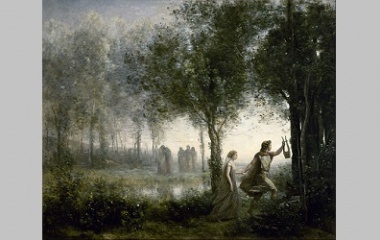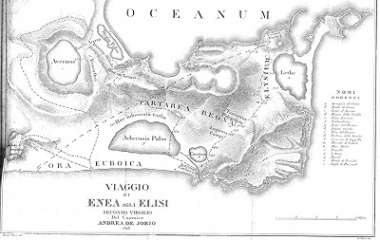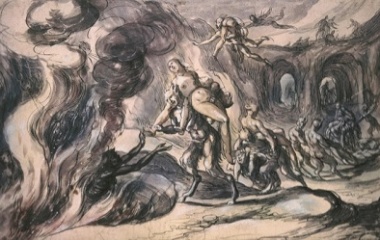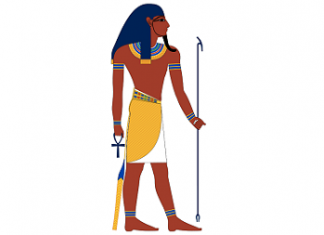In death, much like in life, the Greeks believed the pious and the demigods lived an eternity of bliss, while a moderately good afterlife awaited the moderately pious, and absolute, unrelenting torment awaited those that did not live good lives.
What Is the Greek Underworld?
In mythology, the Greek underworld, REFERRED to as Hades, is the shadowy place below the earth where souls go after death. The Greek underworld is said to be invisible to the living, and is ruled by the god Hades.
Layout
The Greek underworld of Hades is surrounded by five rivers, each representing an emotion connected with the underworld: the Styx (hatred), the Acheron (pain), the Lethe (forgetfulness), the Phlegethon (fire) and Cocytus (wailing). In order to get into Hades, souls would first need to be ferried across by Charon, the ferryman. Charon would receive the souls from Hermes and then guide them to the other side of the river Styx. In order to pay Charon for the journey, the dead were buried with a coin under their tongue. Those who could not pay, or who had not received a proper burial, were turned away.
The Greek underworld’s entrance is not a very welcoming place, with Anxiety, Grief, Diseases, Old Age, Hunger, Fear, Agony, Death and Sleep awaiting you. If that wasn’t enough to scare you off, the entrance is also guarded by Cerberus, a vicious three-headed dog! His duty is to keep the souls from leaving Hades. Once Charon ferries the souls to the other side, the newly dead are then at the mercy of three judges: Minos, Rhadamanthus, and Aeacus. The judges decide the fate of the souls and send them to one of three places. If chosen for Elysium, the souls are first taken to drink from the river Lethe, to forget everything of their former life and commence a restful, stress-free afterlife, compared to the Fields of Punishment! Within the realm of Elysium one can also find the Isles of the Blessed. When a soul has reached Elysium three times in a row, they are then granted access to the Isles of the Blessed where they enjoy unending bliss. The second location, the Fields of Punishment, are designated for those who commit crimes against the gods. Hades decides on their individual punishment himself. The Fields of Asphodel, thirdly, are for the souls who have not achieved particular greatness nor committed crimes against the gods. Customarily demigods, heroes and the notably virtuous are selected for Elysium.
Inhabitants
When the world was divided between Hades and his two brothers, Poseidon obtained the sea as his domain, Zeus, the heavens, and Hades was set to rule over the Greek underworld. Hades is not depicted as a cruel jailor of the dead, but rather as merely a strict, moral presence, yet he was still hated by the gods. He was perceived as the enemy of life by men, as well as the gods. Hades was also known as Pluto to some. He provided wealth and blessed the harvest.
Persephone, the goddess of the harvest, was the beautiful girl child of Zeus and Demeter. Hades fell in love with her and decided he had to have her. He sought the help of Gaia in order to abduct the beautiful girl. Persephone fell prey to their plan when she was bewitched by a narcissus flower. The alluring plant had been planted by Gaia. When Persephone tried to pick it, the ground suddenly gave way beneath her. Hades caught her and swept her away to the underworld in a chariot of gold. When her mother heard of her abduction, she became enraged and brought an end to the harvests. Zeus tried to placate her by sending Hermes to retrieve Persephone, but Hades tricked Persephone again by having her eat pomegranate seeds. The seeds tied her to Hades and his world and she was only able to return to her mother outside of the winter season.
The Erinyes or Furies were three goddesses associated with the souls of the dead. They sought vengeance against those who committed evil, especially children who committed sins against their parents. They would bring madness to the perpetrator or cause disease or starvation to anyone harboring the criminal. Many libations and sacrifices were made to the Erinyes to placate them and avoid their wrath.
The Greek Dead
The souls of the dead lived a purposeless existence in the Greek underworld, unaware of the activities of the living. Once in Hades, they did not continue to grow mentally and their psyche was frozen, sources claim. The dead would have the same appearance they had in life and, if they had lost all their limbs in battle, would appear the same in the afterlife. Offerings were made to appease the dead, who were said to become angered if any malicious persons came near their grave. Sometimes even blood offerings were made to appease the discontented spirits. In Homer’s Odyssey, Odysseus had to give blood so he could commune with the dead. Gifts of jewelry, food and clothing were often left for the dead to use in Hades.
It was believed that time did not exist in the Greek underworld, though the dead were aware of the past and future, according to Homer. The living could only communicate with the dead if they were able to suspend their normal life and time in order to reach Hades.
Orpheus and Hades
Orpheus was a musician and poet who could seduce and control people’s minds with his music. When his wife Eurydice died and descended into Hades, Orpheus was determined to get her back. He used his lyre to mesmerize all the guardians of the Greek underworld and convince Hades and Persephone to release Eurydice. They agreed, with the condition that neither of them look back while leaving Hades. Orpheus, in his excitement to see his wife again, glanced back at her just before she had stepped out of the underworld and she was sucked back into the darkness for eternity.
Eusebia
The Greek word Eusebia means piety, though its meaning is perhaps a bit more complex according to some sources. In ancient times it referred to a person’s duty to themselves, to others and to the gods. Eusebia was also relevant to those already dead. In order for the dead to live well in Hades, they needed to be remembered by the living. Everyday scenes of the person’s life were depicted on tombstones in order to keep the memory of the person alive, and keep them in a blissful state in death.
With the forgetful elation of the Lethe, the peaceful luscious meadows and perfect happiness of the Elysium fields, a life of piety may take on new allure. Modern day pagans have even added springs of water and wine to the already idealistic paradise. In the meantime, the veil between the living and dead continues to flutter mysteriously in the breeze and leave us with the enigma of our mortality and the underworld that awaits us.










